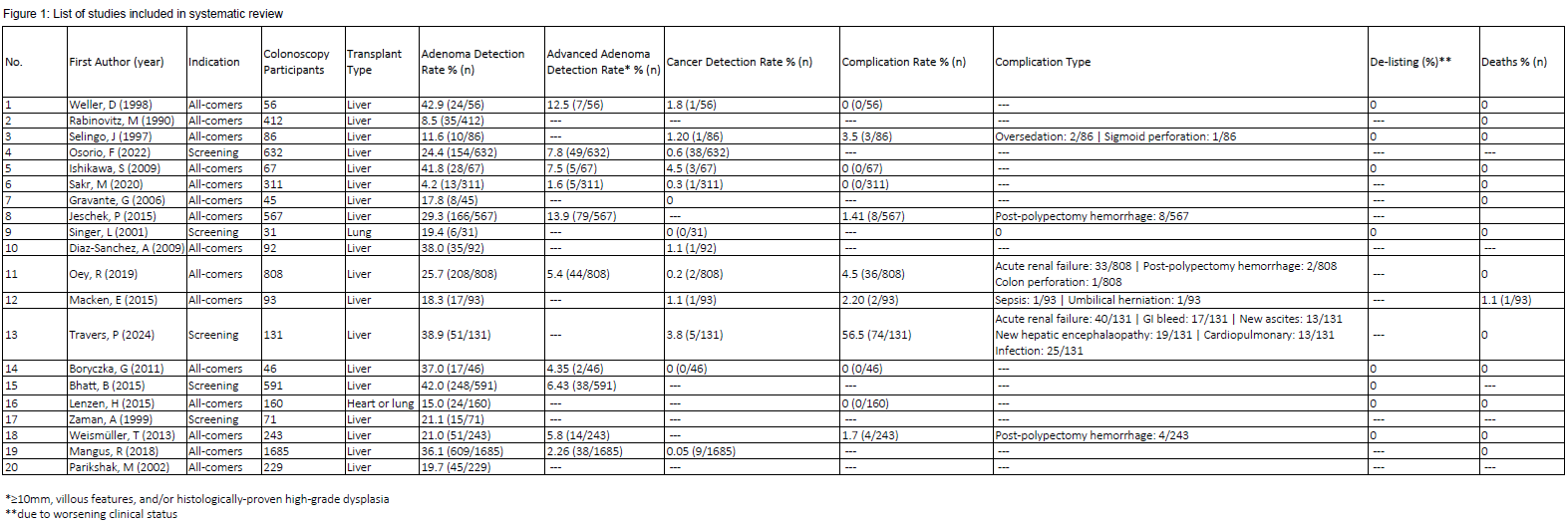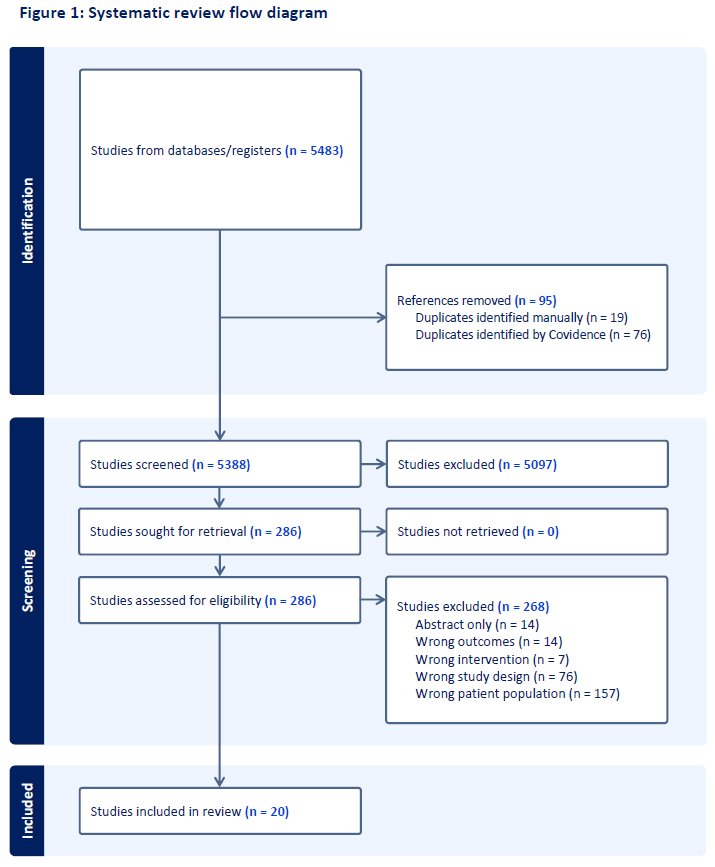Sunday Poster Session
Category: Colon
P0275 - Risks and Benefits of Colorectal Cancer Screening in Heart, Liver, and Lung Transplant Candidates: A Systematic Review
Sunday, October 26, 2025
3:30 PM - 7:00 PM PDT
Location: Exhibit Hall

Michael Perrin, MD, MPH (he/him/his)
Baylor College of Medicine
Houston, TX
Presenting Author(s)
Michael Perrin, MD, MPH1, Rimsha Naeem, BS2, Ruben Hernaez, MD, MPH, PhD1
1Baylor College of Medicine, Houston, TX; 2Fatima Jinnah Medical University, Lahore, Punjab, Pakistan
Introduction: Colorectal cancer screening is routinely performed in solid organ transplant candidates, and although not obligatory per guidelines, is an important consideration during a pre-transplant workup given increased post-transplant immunosuppression. A comprehensive review of risks versus benefits in heart, liver, and lung transplant candidates has not yet been performed. We sought to evaluate colorectal cancer screening in heart, liver, and lung transplant candidates.
Methods: We performed searches of Ovid MEDLINE, Embase, Cochrane, and Web of Science to 3/22/2024 for observational studies or clinical trials. The search was conducted using the MeSH headings as well as equivalent key words and phrases. Studies were extracted using Covidence and independently classified by two reviewers, with disagreements resolved by a third reviewer. The median Newcastle-Ottawa Scale to assess the quality of studies was 7, reflecting adequate quality. Pooled data using adenoma detection rate was possible, but a meta-analysis of other variables was not possible due to the heterogeneity of the data.
Results: Of a total of 5483 studies screened, 20 studies met inclusion criteria (Figures 1 & 2). All 20 studies reported adenoma detection rates (ADR) of 4.2% - 42.9% (1764 patients). 10 studies reported advanced ADRs of 1.6% - 13.9% (281 patients). 12 studies reported cancer detection rates of 0% - 4.5% (62 patients). 10 studies reported complication rates of 0% - 56.5%, with 127 patients experiencing some sort of procedure-related complication. The most common complication was acute kidney injury in 73 patients. A procedure-related gastrointestinal bleed occurred in 31 patients. De-listing due to colonoscopy-related colonic perforation occurred with 1 patient, and this patient later died due to sepsis.
Discussion: A systematic review evaluating the risks versus benefits of colon cancer screening in solid organ transplant candidates is needed in clinical practice to guide screening decisions, and although preliminary work has been done in this area, no systematic review to date has examined the types and rates of complications due to candidate colonoscopies. Our review revealed numerous complications, and overall, the literature does not demonstrate a significant difference in advanced adenoma and cancer detection rates in the pre-transplant population as compared to the general population. This data will be helpful to clinicians in weighing the risks and benefits of colorectal cancer screening in this population.

Figure: List of studies included in the systematic review

Figure: Systematic review flow diagram
Disclosures:
Michael Perrin indicated no relevant financial relationships.
Rimsha Naeem indicated no relevant financial relationships.
Ruben Hernaez indicated no relevant financial relationships.
Michael Perrin, MD, MPH1, Rimsha Naeem, BS2, Ruben Hernaez, MD, MPH, PhD1. P0275 - Risks and Benefits of Colorectal Cancer Screening in Heart, Liver, and Lung Transplant Candidates: A Systematic Review, ACG 2025 Annual Scientific Meeting Abstracts. Phoenix, AZ: American College of Gastroenterology.
1Baylor College of Medicine, Houston, TX; 2Fatima Jinnah Medical University, Lahore, Punjab, Pakistan
Introduction: Colorectal cancer screening is routinely performed in solid organ transplant candidates, and although not obligatory per guidelines, is an important consideration during a pre-transplant workup given increased post-transplant immunosuppression. A comprehensive review of risks versus benefits in heart, liver, and lung transplant candidates has not yet been performed. We sought to evaluate colorectal cancer screening in heart, liver, and lung transplant candidates.
Methods: We performed searches of Ovid MEDLINE, Embase, Cochrane, and Web of Science to 3/22/2024 for observational studies or clinical trials. The search was conducted using the MeSH headings as well as equivalent key words and phrases. Studies were extracted using Covidence and independently classified by two reviewers, with disagreements resolved by a third reviewer. The median Newcastle-Ottawa Scale to assess the quality of studies was 7, reflecting adequate quality. Pooled data using adenoma detection rate was possible, but a meta-analysis of other variables was not possible due to the heterogeneity of the data.
Results: Of a total of 5483 studies screened, 20 studies met inclusion criteria (Figures 1 & 2). All 20 studies reported adenoma detection rates (ADR) of 4.2% - 42.9% (1764 patients). 10 studies reported advanced ADRs of 1.6% - 13.9% (281 patients). 12 studies reported cancer detection rates of 0% - 4.5% (62 patients). 10 studies reported complication rates of 0% - 56.5%, with 127 patients experiencing some sort of procedure-related complication. The most common complication was acute kidney injury in 73 patients. A procedure-related gastrointestinal bleed occurred in 31 patients. De-listing due to colonoscopy-related colonic perforation occurred with 1 patient, and this patient later died due to sepsis.
Discussion: A systematic review evaluating the risks versus benefits of colon cancer screening in solid organ transplant candidates is needed in clinical practice to guide screening decisions, and although preliminary work has been done in this area, no systematic review to date has examined the types and rates of complications due to candidate colonoscopies. Our review revealed numerous complications, and overall, the literature does not demonstrate a significant difference in advanced adenoma and cancer detection rates in the pre-transplant population as compared to the general population. This data will be helpful to clinicians in weighing the risks and benefits of colorectal cancer screening in this population.

Figure: List of studies included in the systematic review

Figure: Systematic review flow diagram
Disclosures:
Michael Perrin indicated no relevant financial relationships.
Rimsha Naeem indicated no relevant financial relationships.
Ruben Hernaez indicated no relevant financial relationships.
Michael Perrin, MD, MPH1, Rimsha Naeem, BS2, Ruben Hernaez, MD, MPH, PhD1. P0275 - Risks and Benefits of Colorectal Cancer Screening in Heart, Liver, and Lung Transplant Candidates: A Systematic Review, ACG 2025 Annual Scientific Meeting Abstracts. Phoenix, AZ: American College of Gastroenterology.
